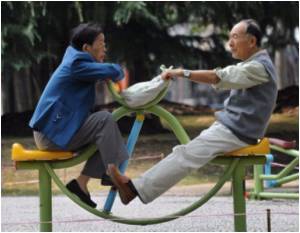Hard exercise and a good, hot cup of coffee or tea keep the brain alert in the elderly, reveals research.

One team led by Dr Zaldy Tan, from Harvard Medical School, Boston, followed the progress of 1,200 elderly men and women with an average age of 76.
The researchers conducted health checks after an average of ten years, which showed that those who engaged in moderate to heavy levels of exercise had a 40 per cent lower risk of developing dementia than the least physically active.
The trend was more prominent in men than in women
"Whether it be a round of golf, a brisk walk or a session on the treadmill, 30 minutes of exercise five times a week can be beneficial at any age," the Scotsman quoted Professor Clive Ballard, director of research at the Alzheimer's Society, as saying.
"The best way to reduce your risk is to combine exercise with a healthy diet, not smoke, and have your blood pressure and cholesterol checked regularly," she added.
Scientists led by Professor Lenore Arab, from the University of California at Los Angeles, monitored 4,800 people aged over 65 for more than 14 years.
People who preferred coffee also experienced beneficial effects-drinking coffee more than five times a week lowered the chances of mental decline by 20 per cent.
"In recent years a number of studies have emerged suggesting a good cuppa could be much more than the obvious accompaniment for a biscuit," said Prof Ballard.
"This latest research adds weight to previous research that indicates caffeine could significantly reduce cognitive decline. However, we are still a long way from being able to say for sure that a regular brew will reduce your risk of developing dementia," he added.
Both the studies were presented at the International Conference on Alzheimer's Disease in Hawaii.
Source-ANI
 MEDINDIA
MEDINDIA




 Email
Email





